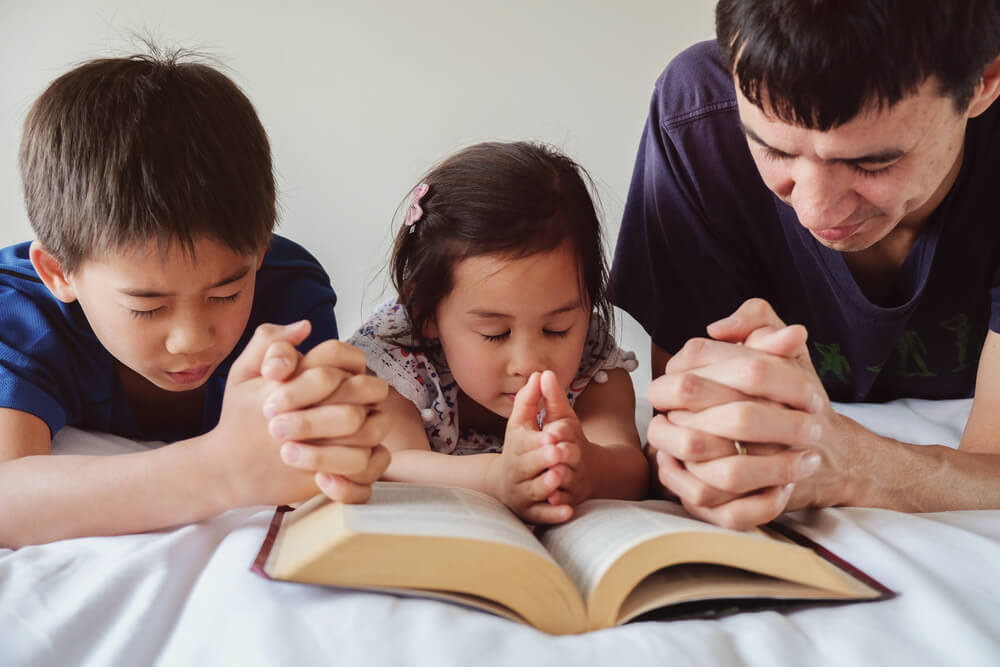Each Sunday during the Prayers of the Faithful, you and your fellow parishioners likely pray for an increase in vocations to the priesthood and religious life. But how often do you think of someone in your own family being the answer to that prayer? Do you think about your child’s vocation, and pray that they will enter whatever path of life God is calling them to?
Fr. Carter Griffin, the rector of the St. John Paul II Seminary in Washington, D.C., stopped by Morning Air® to share how your family can create a culture of vocations, and open up the possibility of your children answering God’s call to the priesthood or religious life.
“I’ve been in vocations work for eight or nine years, and there are definitely common themes that I found,” Fr. Carter said. “I work at a college seminary, so a lot of these guys come right out of the home. They’re coming right out of high school. Some of them are homeschooled, Catholic schooled, a few public schooled. So there are a lot of differences there of temperament, but there are some real common themes I find in the families that are producing vocations. And in many cases, multiple vocations. We’ve had three sets of brothers come to the seminary.”
Parents are the primary educators of their children, and so it is the responsibility of parents to be intentional about teaching their children the faith, introducing them to the various vocations their child could be called to, and encouraging them to follow wherever the Lord is calling them.
“A lot of it is the back office work of just building a kind of internal vocations culture in that family,” said Fr. Carter. “And by vocations I don’t just mean priesthood and religious life, but vocations. What is my calling from God? I think building that kind of culture begins with the own prayer of the parents, and their own sacrifice for their children’s vocation. And a lot of it is just kind of making vocation a part of the ordinary conversation of life.”
So how can parents build this culture? What does that look like on a practical level? Fr. Carter offered some suggestions based on his experience in forming seminarians.
“Part of building a Catholic vocations culture begins with building a Catholic culture in the family,” he explained. “That’s stuff as ordinary and obvious as having some sacred artwork on the wall and having a crucifix in every room. Praying together, praying with children from an early age in age-appropriate ways. Even children who don’t understand what the prayer is know that prayer is happening and know that it’s an ordinary thing to talk to God.”
“I think another important part is getting children to be in situations where they can meet, especially young but not necessarily, priests and religious,” he advised. ” Because oftentimes, a good Christian family is going to hopefully be a model of good marriage. And the children will see that. But they don’t always see, up close and personal, over for dinner, or just casual encounters with young priests and religious. To put them in contact with them I think is really helpful and so important.”
During the conversation with Fr. Carter, a listener named Anna called in, along with her 10-year-old son Aaron, who shared that he wants to be a priest! Morning Air host John Harper and Fr. Carter asked Aaron what made him want to be a priest.
“I saw FORMED, and I saw Brother Francis, and I really want to be a priest because I feel God is calling me since I’ve gotten my First Communion.”
Asked how they’ve developed a culture of vocations in their family, his mother Anna replied, “We continue to pray for him, and ask him to continue to ask Jesus to see what his calling is. But since he was young, I mean he’s young now but even younger, he’s always been telling us how he felt that he wanted to be a priest. So we just encourage him. And we are a practicing Catholic family, and he’s in Catholic school so that’s our support system.”
Fr. Carter noted that Aaron pointed to seeing a movie about the life of St. Francis of Assisi as a factor in his wanting to be a priest. He pointed out that a common thread he sees in seminarians is that they have seen the priestly life lived out and it has been a transformative experience. So though the culture of vocations begins in the family, it is important for children to see a variety of vocations lived out so they can better understand what the Lord may be calling them to in their own life.
“It really has to be that personal contact,” Fr. Carter emphasized. “Young Aaron mentioned Brother Francis, that he had seen. It seems always when I listen to vocation stories, I’m always listening for that hook of who the person was. It’s not always one, but it’s often, ‘I met this priest. I met this brother. I met this sister.’ And often that sort of takes their life in a new direction. Because again, they’re seeing it lived out. And when you see it lived out it’s far more compelling.”
Tune-in to Morning Air weekdays from 5:00 – 8:00 a.m. Central on Relevant Radio® and the Relevant Radio App.


